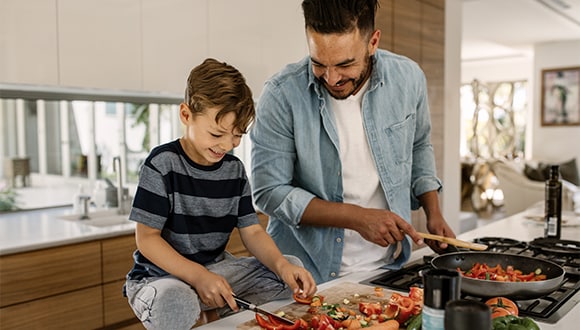Raw vs cooked food: which is healthier?
How do you maximise the health benefits in your fruit and veg? Learn how the different ways of preparing food impact their nutritional value.
Stephanie Osfield
January 2019
The way your food is prepared can have a big impact on the nutrients you get from it. While eating your recommended daily serves of fruits and vegetables, there are some clever ways to ramp up the health benefits of your meals and snacks.

Nutrient-friendly cooking
Generally, the higher the heat and longer the cooking time, the more vitamins and minerals are usually lost.
“For this reason, the healthiest cooking methods are steaming, microwaving and stir-frying, as they’re fast and less likely to destroy nutrients,” says Leanne Elliston, dietitian with Nutrition Australia.
“Boiling is one of least-healthy methods and causes minerals such as potassium, and antioxidants including vitamin C, to leach into the water.”
But that doesn’t mean cooking always removes all the good stuff. Some foods are more nourishing when cooked. Here are some of the stand-outs.
Better cooked
Tomatoes
The rich red colour of tomatoes comes from an antioxidant called lycopene, which becomes easier to absorb when tomatoes are heated, reports Cornell University. Lycopene is an antioxidant that may help to protect against chronic conditions such as heart disease and diabetes, though more research needs to be done.
Corn
“Cooking corn can increase the level of antioxidants and other healthy nutrients by approximately 50%,” says Melbourne-based accredited practising dietitian Melanie McGrice. “These compounds can help protect against chronic diseases such as heart disease and cancer.”
Carrots
Cooking carrots makes their nutrients more available to your body. Carrots have a tough cellular wall that can reduce the conversion of betacarotene to vitamin A to less than 25% when they're eaten raw, McGrice explains. As another antioxidant-rich vegie, it may help reduce your risk of heart disease and cancer, and can help prevent vision loss.
The raw way
Eating certain foods raw can also offer plenty of nutritional benefits. Vegie-packed salads with raw ingredients and vegie sticks in school and work lunch boxes, for example, are great ways to boost the health benefits.
Cooking vegies breaks down some of their fibres and cell walls, which allows them to be more quickly absorbed, but that doesn’t mean eating raw food is tougher on your tummy.
“The saliva in your mouth when you chew and the hydrochloric acid produced in your stomach help to quickly start breaking down raw foods for easier digestion,” McGrice explains.
Here’s a rundown of some foods best eaten raw:
Red peppers / capsicum
Cooking lowers the vitamin C content, so try to serve them raw in salads. If you prefer to cook them, opt for stir-frying or roasting, which preserve more of their vitamins.
Onions
As well as giving food a flavour burst, onions are high in flavonols, including quercetin.
“Flavonols have been linked to reduced risk of chronic conditions such as heart disease and some cancers,” says McGrice. They’re best eaten raw. Heating them causes their delicate cell walls to break, resulting in flavonols leaching out.
Cruciferous vegetables
Broccoli
Broccoli is better raw than cooked. But if you do cook it, a light 3-4 minute steam is better than boiling.
“Boiling broccoli reduces its levels of glucosinolates,” says McGrice, which may help to reduce the risk of cancer.
Brussels sprouts, cauliflower and green cabbage
Just like broccoli, this trio also loses its levels of glucosinolates when cooked.
Kale
“Raw kale has been shown to have a high concentration of carotenoids, which are essential for eye health and may offer antioxidant and anti-cancer properties,” says McGrice. “Baking kale in the oven to produce kale chips may reduce these nutrients.”
While the above facts may help you get optimal nutrition, the important thing is getting your daily dose of fruit and vegies.
Related articles
ARE ALL KILOJOULES CREATED EQUAL?
Experts explain what kilojoules are, where you should get yours from and how many you need to maintain or lose weight.
ARE CARBS BAD FOR YOU?
Carbohydrates get a bad rap – but choosing the right type can actually boost your health and aid weight loss.
FASTING – DOES IT REALLY HELP YOU LOSE WEIGHT?
Various fasting diets claim you can lose weight, improve your health and potentially extend your lifespan. We find out what the evidence is.